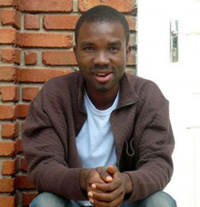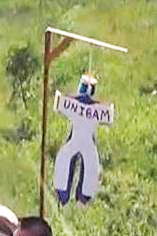Posted By Kent Klindera on July 31, 2013
 Cameroonian GMT activist Eric Lembembe was tortured and murdered in his home. (Photo: 76crimes.com) During a campaign rally last week, the President of Zimbabwe, Robert Mugabe, called for “chopping off the heads” of LGBT persons. This high profile statement from an African head of state is the latest in a series of setbacks in the struggle to reduce the spread and impact of HIV among GMT individuals.
Cameroonian GMT activist Eric Lembembe was tortured and murdered in his home. (Photo: 76crimes.com) During a campaign rally last week, the President of Zimbabwe, Robert Mugabe, called for “chopping off the heads” of LGBT persons. This high profile statement from an African head of state is the latest in a series of setbacks in the struggle to reduce the spread and impact of HIV among GMT individuals.
The past several weeks have not only seen homophobic rhetoric, but also a startling rise in serious violence against individual GMT and HIV activists speaking up for their rights. Most notably, in Yaoundé, Cameroon, Eric Lembembe, a key activist, was found murdered in his home. His house showed no signs of forced entry; however, his body displayed signs that he had been tortured before his death.
Global reaction to the murder in Cameroon was quick. The U.S. State Department, European Union, and the Global Fund to fight HIV, TB and Malaria all came out to denounce the violence and demand that local authorities investigate the murder and deliver justice. I hope their calls can help bring the culprits to justice, but to me, what is needed more is financial support to sustain a broader movement.
The murder comes on the heels of a fire, suspected to be arson, that destroyed one-third of the Access Center run by Alternatives-Cameroun, a long term amfAR grantee partner. A beacon in the community, the center provides primary healthcare to GMT living with HIV, and serves as one of the few safe space for LGBT people to be themselves. Five other national and local Cameroonian organizations working for the rights and health of LGBT people have been vandalized during the past few months. In Cameroon, same-sex sexual activity is illegal and activists suggest the attacks are an organized strategy by individuals who are taking these “laws in to their own hands.” In the wake of these events, all five of the non-governmental organizations have closed their doors and suspended their HIV projects temporarily until the security situation can be contained. In a joint press release they called for “additional financial and institutional support to secure the safety of their staff members and clients.”
 Last week, Zimbabwe President Robert Mugabe publicly stated that Zimbabwe’s LGBT citizens should be killed. It has been a tough few weeks in the world of GMT/HIV issues outside of Cameroon as well. In Nigeria, a bill awaiting presidential signature would outlaw all human rights organizations working on LGBT issues. In Uganda, the LGBT community continues to challenge a bill—under discussion in Parliament since 2009—that would punish same-sex sexual activity with life in prison. It formerly called for the death penalty. In Russia, a new law outlaws “propaganda” related to LGBT Rights—greatly curtailing the ability to reach GMT with vital HIV services. In Jamaica, a young transgender woman was murdered a few weeks ago. And in Belize, an organized faith-based campaign is holding mass protests calling for the lynching of an LGBT activist.
Last week, Zimbabwe President Robert Mugabe publicly stated that Zimbabwe’s LGBT citizens should be killed. It has been a tough few weeks in the world of GMT/HIV issues outside of Cameroon as well. In Nigeria, a bill awaiting presidential signature would outlaw all human rights organizations working on LGBT issues. In Uganda, the LGBT community continues to challenge a bill—under discussion in Parliament since 2009—that would punish same-sex sexual activity with life in prison. It formerly called for the death penalty. In Russia, a new law outlaws “propaganda” related to LGBT Rights—greatly curtailing the ability to reach GMT with vital HIV services. In Jamaica, a young transgender woman was murdered a few weeks ago. And in Belize, an organized faith-based campaign is holding mass protests calling for the lynching of an LGBT activist.
amfAR currently has partners in Cameroon, Belize, Jamaica, Russia, Uganda, and Zimbabwe—who are all on the frontlines of this struggle to reduce the spread and impact of HIV, and we stand strong with our courageous grantee partners. I have had the privilege of working closely with many activists who are the targets of these heinous human rights violations, that are perpetuated by archaic homophobic laws and clearly work against local struggles to address HIV. Each day, I grow more and more concerned for their safety, and at times feel helpless in being able to effect change at a global level.
 In Belize, a faith-based campaign is calling for the lynching of the director of the GMT organization UNIBAM. (Photo: 76crimes.com)However, I also recognize that social change often takes standing up for what you believe in. And I am reminded of something the late Keith Goddard, longtime director of Gays and Lesbians of Zimbabwe (GALZ), once told me: In his eyes, all of these horrors actually indicated progress. To Keith, twenty years ago, LGBT people were forced to remain invisible in many ‘rights constrained’ localities. Today, however, the abuse and crimes against these human rights defenders are clear signs that LGBT people do exist, and these acts are a push back to their increasing visibility and increasingly successful demands for equal rights. In Keith’s view, twenty years from now, those rights that are currently being demanded will actually be achieved—and this is all part of social change.
In Belize, a faith-based campaign is calling for the lynching of the director of the GMT organization UNIBAM. (Photo: 76crimes.com)However, I also recognize that social change often takes standing up for what you believe in. And I am reminded of something the late Keith Goddard, longtime director of Gays and Lesbians of Zimbabwe (GALZ), once told me: In his eyes, all of these horrors actually indicated progress. To Keith, twenty years ago, LGBT people were forced to remain invisible in many ‘rights constrained’ localities. Today, however, the abuse and crimes against these human rights defenders are clear signs that LGBT people do exist, and these acts are a push back to their increasing visibility and increasingly successful demands for equal rights. In Keith’s view, twenty years from now, those rights that are currently being demanded will actually be achieved—and this is all part of social change.
This week, a couple of our Cameroonian colleagues will be joining amfAR staff in New York City to share their story, and meet with others about increasing funding to their program. Clearly, the outrageous news coming from Cameroon shows a step backward in the movement; however, their resolve to continue the struggle is an inspiration to me. We need to stand firm with them, supporting our Cameroonian colleagues’ efforts to address these issues. The only way we shall overcome is by sustaining locally based efforts in the face of these violent backlashes to progress.